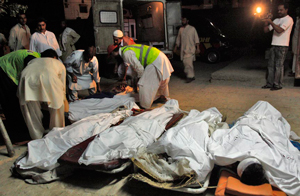In Pakistan 'US military aid came with spies attached'
By Zofeen Ebrahim | Last updated: Aug 4, 2011 - 10:20:25 AMWhat's your opinion on this article?

Pakistani volunteers offl oad the bodies of laborers killed in a shooting from an ambulance in Quetta, Pakistan, July 23. Gunmen riding on a motorcycle shot
and killed fi ve laborers at a construction site for a mosque in southwestern Pakistan, a government offi cial said. Photo: AP/Wide World Photos/Arshad Butt
|
Pakistan's army chief Gen. Ashfaq Parvez Kayani has said that his military can do without the suspended U.S. military aid worth $800 million, but suggested that the funds be diverted to improving the country's economy.
The suspended funds amount to roughly one-third of yearly U.S. security assistance to Pakistan.
Relations between the allies in the war on terror in neighboring Afghanistan soured after U.S. Navy Seals crossed over the border in helicopters and swooped down on Abbottabad to kill Al-Qaeda chief Osama bin Laden in his hideout in the Pakistani cantonment town.
The U.S., which relied on its own intelligence network within Pakistan for the May 2 raid, also stepped up public denunciation of Pakistan's army, accusing it of incompetence in tracking down Mr. Bin Laden or, worse, complicity.
Coming under pressure from the U.S. military on the one hand and facing domestic anger at the Abbottabad raid on the other, the Pakistani army reacted by sending home more than a hundred U.S. military trainers.
“They were not all trainers and the army knew it,” says Ikram Sehgal, a well-known defense analyst. “Of every three or four trainers, one would be an undercover intelligence person trying to subvert the loyalties of our soldiers.”
Signs that the U.S. maintained a spy network within Pakistan became apparent after Raymond Davis, a U.S. official, shot dead two Pakistani men in Lahore on Jan. 27. Mr. Davis, who said the Pakistanis were trying to rob him at gunpoint, turned out to be intelligence operative.
“It's a good thing they were sent packing,” analyst Sehgal said. “We were previously giving in to Washington's every whim. Now we are finally speaking as equals and that is how any relationship should be based—on mutual respect,” he added.
Rahimullah Yusufzai, a senior journalist and an expert on Afghan war, said the U.S. trainers were infiltrating the armed forces and trying to establish their own intelligence network in Pakistan.
According to Mr. Yusufzai, the trainers were part of a package which included light arms and gadgets like night vision goggles which the army was “coerced and tempted” to accept.
“They are often private contractors, outsourced by the U.S. army,” said Mr. Sehgal, adding that the U.S. has more to lose by taking a high-handed stance as “major intelligence sharing may be stopped” by Pakistan.
Another reason why Washington is unhappy with its frontline ally is that its “do more” program failed to enthuse the Pakistani military into launching an offensive against the powerful Afghan militant group led by Maulvi Jalaluddin Haqqani, known as the “Haqqani network.”
Frustrated by the lack of cooperation, the U.S. military has resorted to intensified drone attacks in North Waziristan in Pakistan, where the Haqqani network is based, causing indiscriminate death and destruction.
“Going after the Haqqani network is like putting your hand in an anthill,” said Mr. Sehgal, explaining the Pakistan army's reluctance to launch an offensive. “These terrorist attacks taking place (in Pakistan) today will seem like a Sunday picnic.”
Mr. Sehgal offers three reasons for Pakistani inaction: “The Haqqani network has never carried out attacks on or in Pakistan; the army does not have resources needed to carry out an all out operation against the group and they must be well aware of the consequences of such an offensive.”
The army is also keen to win back the respect of Pakistan's people. There is a growing feeling among its ranks that rising domestic criticism is a concerted campaign to vilify and weaken the army.
Along with domestic criticism, the U.S. is adding “to the barrage of propaganda” to build pressure from outside, says Hasan Askari Rizvi, a Lahore-based defense analyst. “Public denunciation of Pakistan has damaged the U.S.—Pakistan relations more than any other issue.”
INSIDE STORIES AND REVIEWS
-
-
About Harriett ... and the Negro Hollywood Road Show
By Rabiah Muhammad, Guest Columnist » Full Story -
Skepticism greets Jay-Z, NFL talk of inspiring change
By Bryan 18X Crawford and Richard B. Muhammad The Final Call Newspaper @TheFinalCall » Full Story -
The painful problem of Black girls and suicide
By Charlene Muhammad -National Correspondent- » Full Story -
Exploitation of Innocence - Report: Perceptions, policies hurting Black girls
By Charlene Muhammad -National Correspondent- » Full Story -
Big Ballin: Big ideas fuel a father’s Big Baller Brand and brash business sense
By Bryan Crawford -Contributing Writer- » Full Story






 Click Here Stay Connected!
Click Here Stay Connected!








